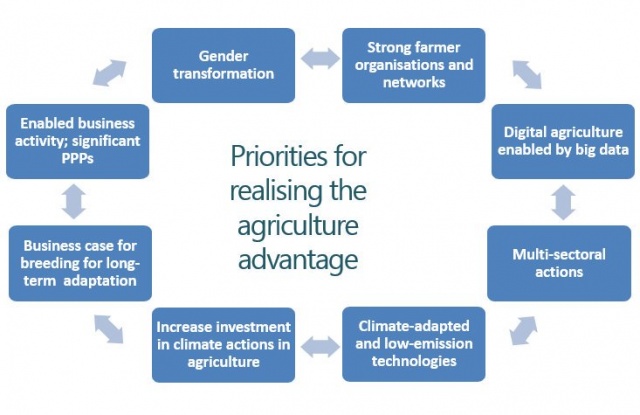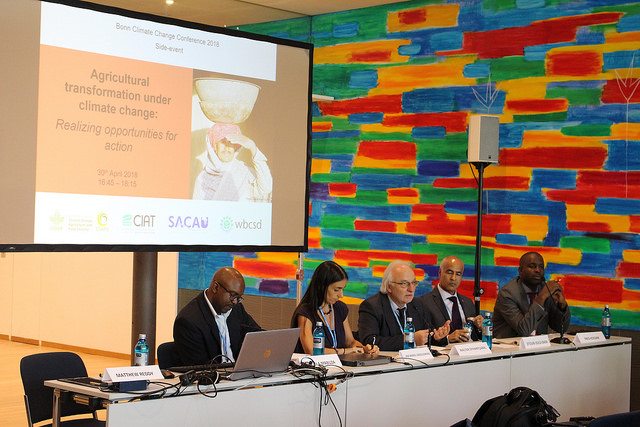After slow progress on climate action for agriculture in Bonn, what's needed?
- From
-
Published on
04.06.18

Following the decision at COP23 to establish the Koronivia Joint Work on Agriculture (KJWA), countries met at the intersessional climate talks in May 2018 to discuss next steps.
Negotiators developed a KJWA roadmap until 2020, which envisages the organization of further workshops. Progress on climate discussions more generally was also slow—to the point that a resumed intersessional will be held in Bangkok in September.
Kick-starting the transformation
While negotiations on agriculture are finally progressing under the UNFCCC, the decision to focus on further workshops without a mandate for action is underwhelming. The case for climate action in agriculture is compelling, and a transformation is needed within the sector in the next decade.
To inform discussions and convey the imperative of kick-starting transformation in agriculture, the CGIAR Research Program on Climate Change, Agriculture and Food Security (CCAFS) co-hosted a side-event entitled, “Agricultural transformation under climate change: realizing opportunities for action,” together with the International Center for Tropical Agriculture (CIAT), the Southern African Confederation of Agricultural Unions (SACAU), and the World Business Council for Sustainable Development (WBCSD). The event brought together scientists, country representatives, international organizations, and farmer representatives to discuss ways to contribute to a transformation.
To set the context, Ana Maria Loboguerrero Rodriguez, the CCAFS Latin America Regional Program Leader, presented eight key elements of the transformation:

Priorities for an action agenda to transform agriculture under climate change.
With Matthew Reddy, Director of Climate-Smart Agriculture at WBCSD, moderating, discussants and participants offered insights on different elements in the framework. For instance, based on Uruguay’s success in reducing emissions from agriculture, Walter Oyhantcabal from Uruguay’s Ministry of Livestock, Agriculture and Fishery noted the importance of farmer-to-farmer networks and communication. Speaking from the farmers’ point of view, Majola Mabuza from SACAU explained that information and communication technologies (ICTs)—already being used by many farmers—are crucial. Fred Kossam from the Malawi Ministry of Environment and Climate Change Management agreed, emphasizing the need for technologies, plus the finance and capacity to use them, to enable countries like Malawi to leapfrog on the agricultural development pathway.

Speakers listen to Walter Oyhantcabal speak about Uruguay’s experience at the “Agricultural transformation under climate change: realizing opportunities for action” side event at the Bonn Climate Change Conference. Photo: Ratih Septivita (CCAFS).
Focus on the livestock sector
Spurring change in the livestock sector, which contributes almost 15% of all greenhouse gas emissions globally —over half of all agricultural emissions —and has the largest potential for reducing emissions, will be crucial for the transformation. Experts from Brazil, Guatemala, and Uruguay explained how they are connecting livestock projects with national measurement, reporting and verification (MRV) systems at a side event co-hosted by CCAFS, the Food and Agriculture Organization of the United Nations (FAO), and the Global Research Alliance on Agricultural Greenhouse Gases (GRA).
In Brazil, where 48% of the country’s emissions result from the beef supply chain, it is critical that clear links have been established between local and national MRV systems, and that these systems meet government and financiers’ needs.”
João Lampreia, Carbon Trust Brazil
Factoring in gender and youth
The engagement of currently under-represented and/or underserved stakeholder groups, such as women, youth and the private sector, will be paramount for an effective, sustainable and equitable transformation.
As a result of limited access to assets (financial, technical, credit) and participation in decision-making processes, young women and men engaged in agriculture can be more susceptible to poverty and thus the impacts of climate change. To address this, CCAFS has developed a strategy to guide the integration of youth needs and priorities into long-term strategies to address climate change in agriculture. In Bonn, CCAFS attended a a press conference held by YOUNGO, the official youth constituency at the UNFCCC, to highlight the need to engage youth in policymaking, workshops, expert meetings and the KJWA; provide access to finance; and build capacity around relevant and emerging technologies for young farmers.
Gender should be another focus of the KJWA: adaptation measures identified must take into account gender-based needs of vulnerable smallholders, or they risk exacerbating gender-based inequalities. Prior to the conference, CCAFS supported the Kenyan submission on gender to the UNFCCC Subsidiary Body for Implementation (SBI). In Bonn, CCAFS participated in two workshops on gender organized by the UNFCCC to discuss Parties’ submissions. The first emphasized the importance of sex-disaggregated data and gender analysis in monitoring and reporting on adaptation, and the second focused on ways to improve the gender balance in national delegations.
A way forward
Delegates convening for COP24 this December in Katowice, Poland, will need to actively support a transformation in agriculture if they intend to achieve the goal of limiting global warming to less than 2°C.
“Change is inevitable but transformation is by conscious choice” – @amloboguerrero on the #agriculture transformation needed under #climate change. Read CCAFS’ recommendations for #KJW: https://t.co/fflr7FPZsa #SBSTA #SB48 #AgTransform @CGIARclimate_LA @CIAT_ @sacau_media @wbcsd
— CCAFS cgiarclimate (@cgiarclimate) April 30, 2018
There is no time to waste. While there is value in continued dialogue under the KJWA, CCAFS is committed to a shift from dialogue to action that is needed now to support an agricultural transformation and meeting the goals of the Paris Agreement. CCAFS is developing a research agenda based on the key areas laid out in the framework for transformation above. This framework—still evolving—will serve as the guiding structure for action, to be discussed at a series of side-events co-hosted by CCAFS and partners at COP24.
We hope you will join us in this mission, and invite you to help guide it through discussions at COP24. Check back here for a link to our COP24 side-event series event page, coming soon.
Read more:
- Report: Measurement, reporting and verification of livestock GHG emissions by developing countries in the UNFCCC: current practices and opportunities for improvement (French and Spanish versions coming soon)
- Blog: Leave no one behind: the youth also have a say in the Koronivia Joint Work on Agriculture
